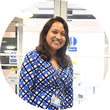- OT
- Life in practice
- Practitioner stories
- “You can still have a fruitful life”
My vision
“You can still have a fruitful life”
Sabeena Kaushali Weyhenage (pictured) was practising medicine when she lost her sight over the course of a year. She tells OT about her new role as an eye clinic liaison officer at the Royal Eye Unit at Kingston Hospital


Sabeena Kaushali Weyhenage
20 December 2019
Sometimes when I get my patient experience report I am crying because of the things that they say. My patients will come and give me flowers, chocolates and cards.
I didn’t have one-to-one support in hospital when I was diagnosed with my eye condition and told that I would go blind. I still remember when they told me that I had this eye condition I asked if there was anything that they could do and they said, ‘No I’m sorry.’
Sometimes when I get my patient experience report I am crying because of the things that they say. My patients will come and give me flowers, chocolates and cards
During the early stages of my blindness I was living alone. I was married but my husband left me as I lost my sight and I didn’t have family with me. I went through a severe depression and didn’t leave the house for six months. I had trained and worked as a doctor but I couldn’t practise.
Eventually I thought, ‘You know what I can’t just stay home and cry about it.’ I decided to become an eye clinic liaison officer. The Royal National Institute of Blind helped me to gain the skills I needed to undertake this role. They have been a major pillar of support throughout my journey.
The role
My job involves providing initial emotional support to patients who are often in shock and have heard that they are going to go blind. There are many patients who think that their life is over. It’s about asking them why and then they will tell you, ‘I used to read, I used to run, I used to play football.’ Then it is a matter of letting them know that they are starting a new journey as a visually impaired person. There is going to be a learning curve, they will have to learn new skills, but they will be able to do most of the things that they used to be able to do before.
The two or three things that I don’t do myself as a blind person are driving and practising medicine. Almost everything else I do myself with a little bit of support. At work, all of my colleagues are really helpful and I also have a support worker provided by the Government.
I have an understanding of what it is like in the beginning to be learning how to do everything from scratch. I use my own experience to help people understand that it will only get better. This is the worst it can get.
My support for patients is ongoing throughout their sight loss journey. I also provide practical and employment advice. I assess patients individually and then decide which support they would benefit from. If they agree with me, I refer them to those services. When I realise that they are empowered enough to get on with their lives I end my support but they can always come back to me.
Emotional impact
Sometimes when I get my patient experience report I am crying because of the things that they say. My patients will come and give me flowers, chocolates and cards. Lots of patients take my advice on board. They think, ‘She has been there and done that.’
In a weird way the job makes me feel better about being blind myself. I think that it happened for a reason – I can use my experience to help someone. That is why I find it very rewarding. It doesn’t matter what level of sight you have, you can still have a fruitful life if you receive the right support and are willing to learn new skills.
Sabeena Kaushali Weyhenage qualified and worked as a doctor until sight loss ended her career. She retrained as an eye clinic liaison officer, with her contribution recognised through Bayer’s 2018/19 Ophthalmology Honours programme.
- As told to Selina Powell.

Comments (0)
You must be logged in to join the discussion. Log in